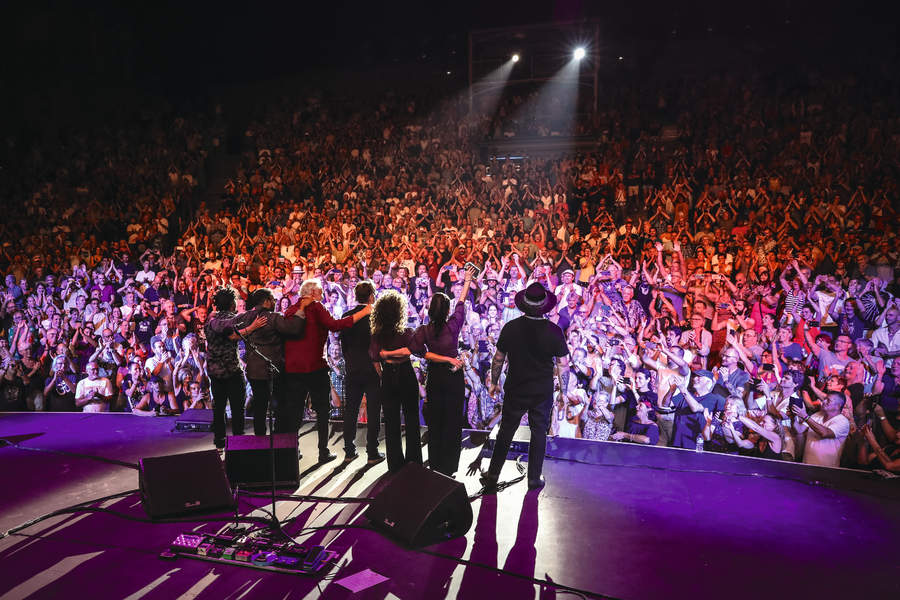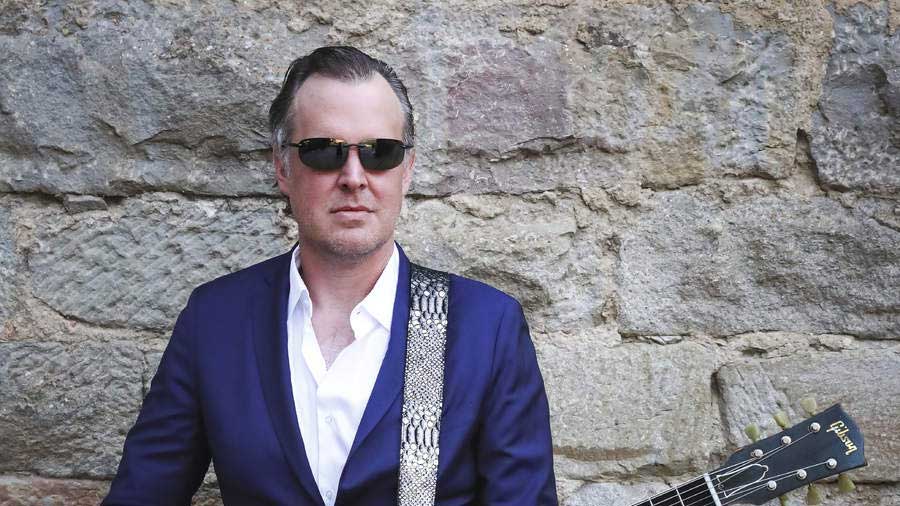
It’s almost 9.30pm, and Joe Bonamassa has vanished. The night air is hot. We’re in the wings at Théâtre JeanDeschamps, a vast open-air amphitheatre inside the 13th-century citadel of Carcassonne, a hilltop town in the Languedoc region of southern France.
Barely half an hour ago Bonamassa was sitting here on a flight case, Diet Coke in one hand, cigar in the other, chatting to bassist Calvin Turner about this and that. The base-level confidence, perhaps, of someone who’s been gigging professionally since childhood; a man who’d played with John Lee Hooker and BB King by the time he hit puberty.
“We could be talking about cymbal stands at nine-twenty-five p.m.,” he says. “By the time I go on, that’s it. I’m the other guy.”
It’s extraordinarily picturesque here. A gothic stone footbridge leads you over the River Aude from the bistro tables, cathedral bells and cheese shops of Carcassonne’s old town. To reach the castle you ascend narrow, twisty streets past ornate balconies, ‘Tabac’ signs, and peach-coloured houses with tall windows and old wooden shutters. Cicadas scream into the heat. Shrill swallows dart overheard as the sun descends.
In the auditorium, seats are filling. Last night Tom Jones played here, the sounds of Delilah and It’s Not Unusual drifting down the hill and through our hotel window. Tonight, it’s Joe Bonamassa.
Suddenly the lights go down. The audience cheers. The band head out. From across the stage a swift, streamlined shape in Hugo Boss strides out. The gnarly soul-rock swagger of Evil Mama starts up. The suit faces the audience, sunglasses in place: a Matrix character with a Les Paul. It hides a great deal about him. The ‘other guy’ has arrived.

There are two things that tell you a lot about Joe Bonamassa, and they aren’t his guitars or his suits. The first is the cigars he smokes.
A few hours pre-show, within the castle’s high, stone walls, we find him sheltering from the heatwave, at the side of the stage, puffing on a freshly lit Corona. Crew members bustle with gear. In his baseball cap, comfy jeans and ‘Umbria Jazz Festival’ T-shirt, Bonamassa doesn’t look all that different.
The cigar, and the Rolex on his wrist, hint at something else.
“I have an addictive personality,” he reasons, as the sound of French jousting commentary booms over the wall. “I have five hundred guitars, five hundred amps… Things escalate. In one way, cigar smoking is man’s folly. Like that [indicates the one in his hand] you’re taking thirty pounds, rolling it up and taking the lighter to it. But it’s relaxing. Kenny Wayne Shepherd and I, we enjoy cigars. I think it’s a forties thing.”
So in your fifties it’ll be…
“Pipe,” he says, grinning impishly. “Like a calabash pipe. A nice Dunhill. If you’re gonna do it, do it right.”
The second thing is the shoes he’ll wear tonight: simple blue-and-white sneaker/plimsoll things. Non-rock-star footwear that’s surprising once you notice it – the suit tends to grab your attention first. It’s a small detail, but the closest visual clue on stage as to his real self. A pragmatist. A guitar prodigy who, at twenty-five, was tour-managing his own shows, even giving himself a fake name.
“John Carson, ‘don’t call me Johnny!’” he recites, with the panache of an enthusiastic hustler. “So John Carson would advance the shows, I would do sound, I’d do monitors for the band. Every fibre of my being was dedicated to fiscally surviving yet another year. Can we keep this going? It was a fun time but it was also a very stressful time.”
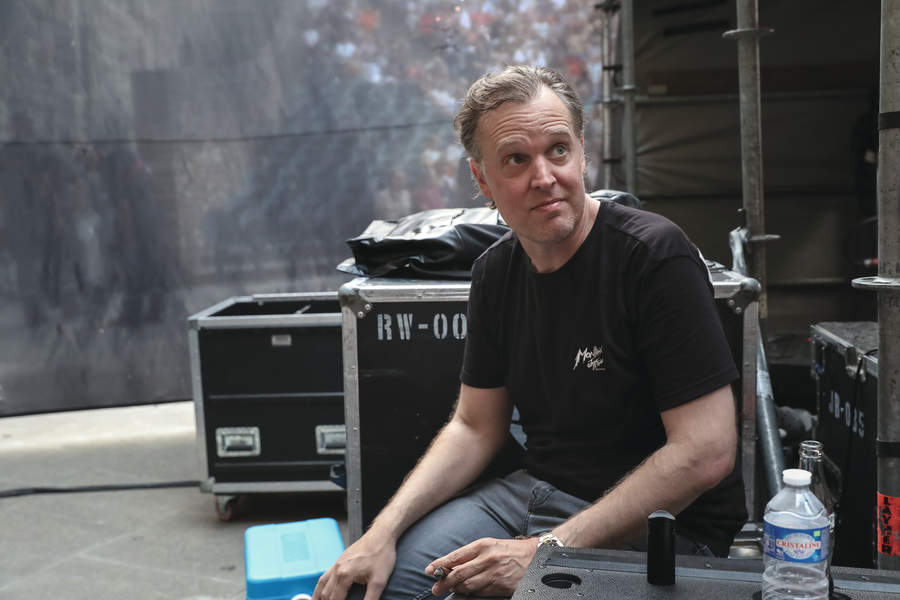
At forty-six, Bonamassa has the softened pose of someone learning to be comfortable in his own skin – still somewhat anxious that all this is here for him. There are grey hairs at his temples. His voice is kind. He does things that most named artists don’t do in interviews, like give you his full attention in a natural way, and ask the odd, casual question about yourself. In short he’s surprisingly normal. Definitely a bit weird, but not in the dull, blues-robot way that some have made him out to be.
And he worries, terribly, about not being good enough. About a lot of things. The expectations of his fans. The many people ittakes to “get this idiot on stage at nine-thirty p.m.”. The perspective of age – and some tough love from close friends – has helped.
“So when I’m up there thinking that I should give everybody their money back because I’m so fucking horrible,” he says, his large eyes down. “If I listened to what I think is my worst show, and my best show, there’s not much difference.”
Sound-check is pain-free. The band gaze, impressed, at our medieval surroundings, looking nothing like their stage selves. Guitarist Josh Smith could be in a punk band, all long, baggy shorts and arms and legs full of tattoos. Backing singer Jade MacRae is cool and indie-ish in a Van Morrison T-shirt. Keyboard player Reece Wynans (formerly with Stevie Ray Vaughan’s Double Trouble) looks like a grandfather on holiday, in his North Face top, trainers, and socks with penguins on them.
They’re a tight group. MacRae and fellow backing vocalist Danni De Andrea are married to members of the crew. Smith is an old friend, who produced and co-steered Bonamassa’s new blues compilation Blues Deluxe Vol 2 – a more soulful answer to the volume he released 20 years ago. Like Bonamassa, and their other good mate, blues guitarist Kirk Fletcher, he started young.
“We all love Stevie Ray Vaughan and Eric Johnson, we all started in our bedrooms,” Bonamassa recalls, as the sound of horns and more jousting commentary soars over the battlements. “It’s funny, looking at it now. We’re not the elder statesman yet, but we were all the kid guitar players.”
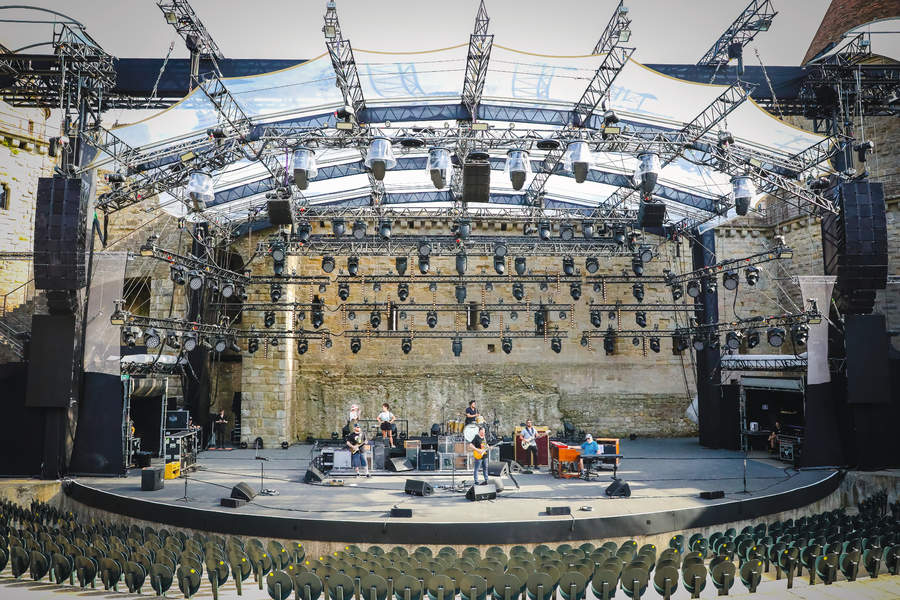
Bonamassa grew up quickly, and strangely. Surrounded by adults and singularly focused on music, he’s had the odd, elevated life of a child star with a side of Catholic guilt. His parents kept him grounded. When he first met his manager, Roy Weisman, Weisman was 22 and Bonamssa was 12. They’ve been business partners ever since.
“I am kind of an eccentric. Except now,” he says, grinning, suddenly a 12-year-old boy again, “I have a credit card.”
His voracious collecting attests to this. Rooted in happy childhood days spent driving miles with his father (a vintage dealer) to collect beautiful instruments, it’s grown into something that rivals his music reputation. On tour, preshow, he’ll drive out for hours to pick up a new purchase. In the US especially, people meet him at the back of the bus with guitars and family heirlooms. Most of them are fans, others just know him as a collector.
“It’s the chase,” he says. “I always enjoy that. None of my collection’s from eBay. To me it’s too easy. I don’t need a guitar, but I do collect stories. Y’know: ‘This was grandpa’s lighter, it’s been in the family eighty-five years.’ They’re selling you some of the last connection they have to a lost relative. That’s what makes collecting fun.”
Today he shows me an amplifier that cost as much as an Aston Martin. At home he has a gig poster sent by Buddy Guy to his parents, from a 1990 show that Bonamassa played at. It all fills his homes in LA, New York and Nashville.
“It’s not in piles, I’m not a hoarder,” he adds. “It’s well displayed, museum level. But it’s everywhere; the bedroom, the bathroom, the kitchen. People will see some of the rarest shit in the world, just in the atrium. I’ve got French presses next to an old RCA sign. It’s not for everyone. People come to my house and go: ‘Clearly you are not married…’” He pauses with a little half-smile. “But my girlfriend, she’s very good about it.”
Bonamassa cultivated these tastes earlier than most. As an 11-year-old netting up to $300 a gig, he was given a stipend to buy ‘kid’ things, “but I would buy wah-wah pedals and more gear. When I got my record deal I bought a Sega Genesis system.”
As the tours grew he spent less time in school and more time with tutors. He was tutored on and off from ninth grade. By twelfth grade he was working so much he effectively did all his schooling in about eight weeks.
The upshot of this was that he didn’t spend time with people his own age. All the usual social interactions, cliques and first dates of adolescence were bypassed. In place of school gym class, aged 17 Bonamassa had to join an actual gym, where he parked himself on an exercise bike and watched the OJ Simpson trial.
“They had it on TV,” he remembers. “So I’m sitting there watching the OJ trial, pedalling the bike just clocking the hours…”
He stops for a second. “It was strange.”
The French jousting has stopped. Cicadas jabber loudly into the sunshine, and there’s the occasional clank of gear. Otherwise it’s quiet.
At the entrance fans accost him for autographs and selfies. Bonamassa signs everything, and chats companionably to one man he’s met before. Eventually his tour manager/friend Clay – a six-foot-something Georgia native with a look that’s part bodyguard, part bro-country singer – steers him away towards the catering area.
On sheltered tables there are dressed salads, local cheeses, charcuterie, fresh melon, desserts. Water and sodas are retrieved from fridges; it’s too hot for anything stronger. Bonamassa eyes up the plates. To stay in shape on tour, he tries to eat one meal a day.
“Because we have the Hollywood Bowl [show, coming up], I have a bowl of tomato salsa, two chicken breasts and a mixed salad,” he mutters grudgingly. “It’s about as fun as a root canal.”
The sun beats down brightly. They have a day off tomorrow; he doesn’t miss his formative years of 13 shows in a row, driving the van all day and lugging gear up stairs. Things that break a lot of people, if temptations don’t.
“I was never a wild person. I never did drugs. I was never offered cocaine, ever, in my entire life.” He considers this for a moment. “I’m slightly offended by it. I’m just not that guy, right?”
He remarks that he’s getting greyer. “If I start dying my hair, like, jet-black, there’ll be talks…” He pauses, considering this. “I think Metallica have aged well. James Hetfield’s really underrated as a rhythm player. His right hand is serious.”
Fellow Peter Green aficionado Kirk Hammett is a closer acquaintance. The Metallica guitarist is a neighbour of Bonamassa’s parents, for whom he bought dinner on their forty-eighth wedding anniversary. “Kirk’s a sweet guy. He’s just a geek, like the rest of us.”
By the time we return there’s a crowd at the auditorium gates. The man they’re here to see treads cautiously behind them. “Look down, look down…” Joe mutters in our ear, as Clay smoothly leads us past the crowd and through the side barriers.
Back on the stage, flight cases of outfits are opened. Bonamassa has another cigar and surveys a rack of suits, of which he has about 30 on tour. Surely there’s some sort of deal in place with Hugo Boss by now? “You’d think, right?!” he exclaims in (half)mock-outrage.
By nine o’clock the sun is dipping. The auditorium is a sea of summer fabrics and fluttering fans. It could almost be a tennis crowd, until you notice the Bonamassa, Clapton, Fender, AC/DC, Hard Rock Cafe and other rock-friendly T-shirts dotted among the rows. The air is still hot. A hornet the size of a fist inches towards our feet.
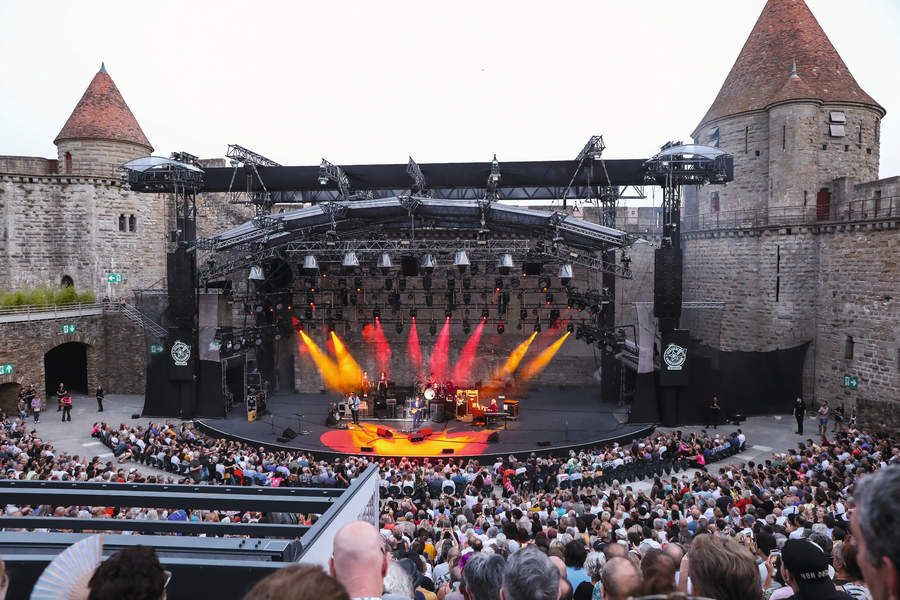
Bonamassa re-emerges in suit trousers and shirt, adjusting his cuffs. “You want a water or something?” he asks. We’re good. He nods and disappears into his dressing room, built into one of the castle towers.
Inside it’s all circular stone walls, mirrors and low-lighting. An animal skin rug lies under two brown leather couches. A jug of lilies sits on a small table. On other surfaces there are water bottles, towels, kettle, coffee maker, a bottle of red wine and a glass. There are no guitars. He stopped warming up about six months ago.
“I found I played better,” he reasons. “It’s a half-hour thing. I suit up, pour a glass of wine, get into character.”
Then suddenly it’s show time. Audience cheers swell as the band stride on stage and tear into a blazing Evil Mama and the outlaw-fringed blues rock of Dust Bowl. I Want To Shout About It – originally by Ronnie Earl And The Broadcasters, and one of many lesser-known soulful cuts on Blues Deluxe Vol. 2 – shows starkly how far Bonamassa has come as a singer since his throatier Vol 1 twenty years ago.
He still struggles with demons. His girlfriend (also a musician) persuaded him to start seeing a new therapist, telling him not to try to “outsmart” them (“I was doing that before”). Last year, in an interview with Guitar Player, he said he “hated” the way he played and sang. Carlos Santana phoned him to check he was alright.
Meanwhile, Joanne Shaw Taylor, an old friend, gave him some tough love and a hard shot of perspective. It was a real “reset”, he says. “It just got me out of this fog of self-doubt. Like, no matter what happens up there, it’s going to be fine. It’s not life and death. The sun will rise again tomorrow if we don’t play tonight.”
On stage the heat starts to lift. Church bells chime and darkness falls over a genuinely stunning Self-Inflicted Wounds, Jade MacRae’s vocal solo adding extra spine-tingling value, like Clare Torry on Pink Floyd’s The Great Gig In The Sky. It’s the sort of original, bluesy rock epic that Bonamassa could fill whole sets with, were it not for people’s expectations of fast solos.
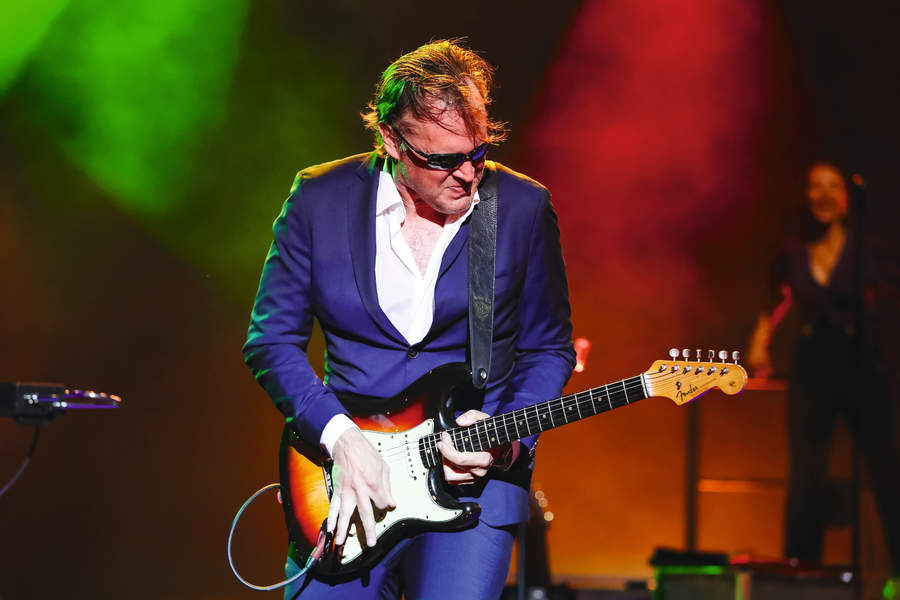
And there, perhaps, lies his real neurosis: an acute sense of responsibility, to just about everyone. His own standards. His fans. His family, to whom he’s quietly very devoted (he’s an uncle of two). His crew and company, “sending their kids to college” on the Joe Bonamassa dollar. Knowing that, at this point, he has little cause for complaint but wrestling with insecurities anyway. Those dark moments of the soul that no one is immune to. These things that stop him straying, too far, from the persona he’s built.
“You start looking at it, like: ‘Well, maybe I’ll never do that folk record,’ or whatever. Because we’ve developed an audience. They want the fire and the fury. No matter how good it could be, they’d be like: ‘Just play the fucking guitar, man.’ I know that.”
Don’t you ever think that if you did, say, give your fans a folk record, they’d like it anyway, because they like you?
“Maybe,” he muses, as if it’s not something he’d considered. “Some of them, the true fans. But you know… what really makes my day is, by the end, they’re all standing. You see the looks on people’s faces, they’re seeing guitars they’ve seen in books, the Matrix character they’ve seen in magazines. And you’re going: ‘You know what? As campy as this shit can get sometimes, somebody likes it!’ The joy it brings people, that’s all I need.”
He has a point. They do go mad for the fretboard acrobatics in (Otis Rush cover) Double Trouble; the blistering rip through Led Zeppelin’s Dazed And Confused solo; the powerful shades of blues that pour through his fingers like water.
After the show tonight, they’ll drive on to more European dates. After that there’s the next Keeping The Blues Alive charity cruise. New Black Country Communion music in the works. More touring. It’s a lot to steer, for a guy who dreamed of playing guitar for a living. If he could just play guitar in a band, for a day, who would it be with?
“Free,” he says simply, smiling. “That’s the gig I was born to do. Free. Simon and Paul, call me. I’m your guy. I’ve been training for it my whole life. I know all those songs. That or Bruce Hornsby.”
By rousing, blissed out closer Mountain Time, everyone in the auditorium is on their feet. The front rows sing back every word. Something seems to shift in Joe’s expression. For all the savviness and pragmatism in the Bonamassa empire, there is nothing pragmatic here. At its heart, music isn’t like that. It’s being in a moment. It isn’t a business transaction.
“Not everyone gets to the top of Everest,” he observed earlier. “But you know what? Base camp’s pretty good. I’ll play the same stage as Tom Jones any day.” He looked around. “It’s nice here, you know?”
Blues Deluxe Vol. 2 is out now via Mascot/ J&R Adventures.
